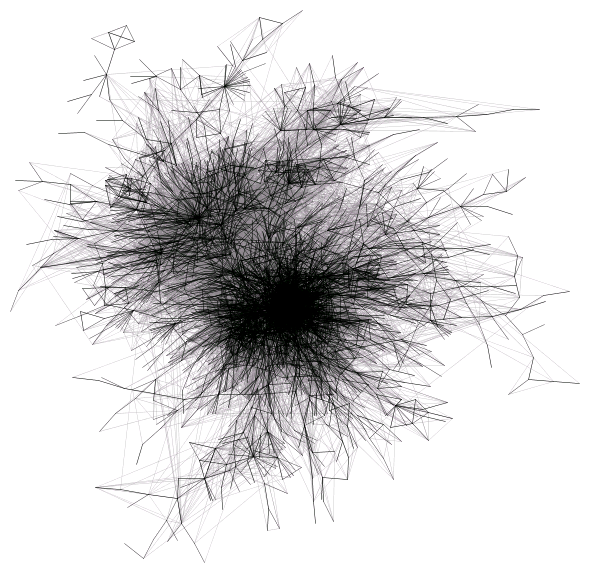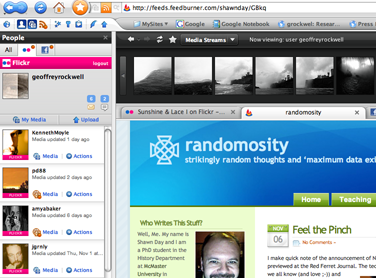
Matthew Hurst of Microsoft’s Live Labs (and apparently co-creator of BlogPulse) has a smart blog, Data Mining. See for example, his post on The Future of News which has some useful “thought starters”. (Confession: I’m a Google News junkie.) See also his Mapping The Blogosphere from which I took the image above.
Category: Blogs and Blogging Culture
Michael Geist: iOptOut
Tired of getting unsolicted phone calls? Michael Geist has set up a web site, iOptOut to allow people to opt out of organizations that are exempted from the do-not-call registry. The site lets you specifically ask exempted organizations to not call you. We need more useful social sites like this.
Michael Geist explains iOptOut thus on his (excellent) blog:
I began to develop the site soon after the do-not-call bill became law. The premise is simple – under the law, exempted organizations (which include charities, political parties, polling companies, newspapers, and companies with a prior business relationship) are permitted to make unsolicited telephone calls despite the inclusion of a number in the do-not-call registry. However, organizations must remove numbers from their lists if specifically requested to do so.
Introducing Guy Parkinson
Some of you may have noticed another voice on theoreti.ca. Guy Parkinson is now blogging here. Guy and I studied philosophy together at the University of Toronto and met in a Plato class. He is the New Media Technical Director for Brandworks a Toronto advertising and new media company.
NYT: Cell phone novels take off in Japan
The New York Times has a story by Norimitsu Onishi,
Thumbs Race as Japan’s Best Sellers Go Cellular – New York Times, about how novels written in snippets on cell phones and posted to special blogs and then published in print were five of the top ten best-selling novels.
The boom appeared to have been fueled by a development having nothing to do with culture or novels but by cellphone companies’ decision to offer unlimited transmission of packet data, like text-messaging, as part of flat monthly rates. The largest provider, Docomo, began offering this service in mid-2004.
I wonder if the serialization over time builds anticipation and sales? Does writing them on a cell phone change the prose?
Spinuzzi and Digital History Hacks
Clay Spinuzzi has a blog, Spinuzzi, that was recommended on Humanist. His recent posting a long thoughtful reflections on methodology, especially as applied to rhetoric and writing research. He comments on Composing Research by Cindy Johanek which critiques the ostensibly anectdotal methods of many researchers in rhetoric and communication.
Another blog that Shawn Day pointed me to is William J. Turkel’s Digital History Hacks. He writes longer posts on topics like What’s the Opposite of Big History? He is comfortable with programming and hardware design.
grockwel: Research Notes

Welcome to theoreti.ca, or the new version of grockwel: Research Notes. Why the change? Well … it was time to upgrade and it was time to bring my research and personal pages together in one place. Thanks to Shawn for all the work figuring out how to move a blog that has been going since 2003 – images and all. Please redirect your links and RSS readers here.
In the next month geoffreyrockwell.com will also be moved here and the interface coordinating.
We feel fine: Blog harvesting
 We Feel Fine is “an exploration of human emotion, in six movements” that harvests recent blog posts for “I feel” or “I am feeling” and then stores information for visualization. There is an applet where you can look for “men who are abiding”. Thanks to Guy for this.
We Feel Fine is “an exploration of human emotion, in six movements” that harvests recent blog posts for “I feel” or “I am feeling” and then stores information for visualization. There is an applet where you can look for “men who are abiding”. Thanks to Guy for this.
Flock – The Social Web Browser
 I’ve been experimenting with Flock – The Social Web Browser. It to have integrated support for social network sites like Flickr and Facebook. The interface is confusing, perhaps because of everything it is trying to do, or my not getting it. Some of things it does are:
I’ve been experimenting with Flock – The Social Web Browser. It to have integrated support for social network sites like Flickr and Facebook. The interface is confusing, perhaps because of everything it is trying to do, or my not getting it. Some of things it does are:
- Let you see your Flickr photos in a bar across the top so you can drag them into other services.
- Upload to social network sites.
- Track your Flickr and Facebook friends.
- Read blog feeds.
The Mind Tool: Edward Vanhoutte’s Blog
Edware Vanhoutte, who has done some of the best work on the history of humanities computing (though much is not yet published), has started a blog. In his first entry, The Mind Tool: Edward Vanhoutte’s Blog, he summarizes early text books that were used to teach humanities computing. It would be interesting to look at how these 70s and 80s books conceive of the computer and how they differ from the 50s and 60s work like that of Booth.
Blog Action Day
 Johnny Rogers reminded me that today is Blog Action Day when we are supposed to blog about the environment. I wish this wasn’t such a depressing subject, but my understanding is that this is the big frog in warming water problem that everyone knows about but noone will do anything about. The problem goes something like this:
Johnny Rogers reminded me that today is Blog Action Day when we are supposed to blog about the environment. I wish this wasn’t such a depressing subject, but my understanding is that this is the big frog in warming water problem that everyone knows about but noone will do anything about. The problem goes something like this:
We can have clean energy (coal with scrubbers) or we can have energy that doesn’t produce greenhouse gases (nuclear) but we don’t seem to be able to have both in the quantities we need. The amount of energy we need is growing with countries like India and China adding plants at a rate that will wipe out any improvements in North America and Europe. (See New Coal Plants Bury ‘Kyoto’.) Running out of oil may not cure us because there is lots of coal (under Alberta among other places) that can be converted into energy or oil. Biofuels won’t solve much as there just isn’t enough biomass unless we clear cut in a way that doesn’t replenish the soil. Solar and the other forms don’t seem viable replacements yet.
What is depressing is the politics (everyone agrees it is a problem, but no politician is willing to risk drastic solutions) and the the economics (to cut back on greenhouse gases significantly may mean serious economic disadvantage that is not sustainable politically.) In short we are watching ourselves warm the planet. Time to buy beachfront property in Winnipeg.
Which brings me back to Blog Action Day. What will BAD do to change this tragedy? How can the blogosphere contribute, or will it just give the wealthy (who can afford to have blogs) a “feel good” way of doing nothing other than vent? The only way to really change the outcome may be to relinquish the high-tech life style that includes blogging. Look at the energy consumption table for computers – Barrie Hydro estimates that two computers left on at night waste $100.00 per year. Now look at some of the highlights of Computers and the Environment. Computers are part of the problem.